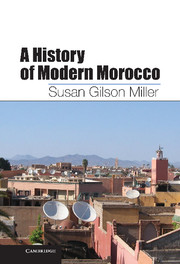Book contents
- Frontmatter
- Contents
- List of Maps and Illustrations
- Acknowledgments
- Note on Transliteration and Translation
- Chronology
- Who Is Who?
- Introduction
- 1 The Closing of the Era of Jihad (1830–1860)
- 2 Facing the Challenges of Reform (1860–1894)
- 3 The Passing of the Old Makhzan (1894–1912)
- 4 France and Spain in Morocco
- 5 Framing the Nation (1930–1961)
- 6 The First Age of Hassan II
- 7 The Second Age of Hassan II
- 8 Summation
- 9 Postscript
- Key Abbreviations
- Glossary
- French Rsidents-Généraux in Morocco, 1912–1956
- Sultans and Kings of the ʿAlawite Dynasty, 1664–2012
- Notes
- Bibliography of Works Cited
- Index
2 - Facing the Challenges of Reform (1860–1894)
Published online by Cambridge University Press: 05 February 2013
- Frontmatter
- Contents
- List of Maps and Illustrations
- Acknowledgments
- Note on Transliteration and Translation
- Chronology
- Who Is Who?
- Introduction
- 1 The Closing of the Era of Jihad (1830–1860)
- 2 Facing the Challenges of Reform (1860–1894)
- 3 The Passing of the Old Makhzan (1894–1912)
- 4 France and Spain in Morocco
- 5 Framing the Nation (1930–1961)
- 6 The First Age of Hassan II
- 7 The Second Age of Hassan II
- 8 Summation
- 9 Postscript
- Key Abbreviations
- Glossary
- French Rsidents-Généraux in Morocco, 1912–1956
- Sultans and Kings of the ʿAlawite Dynasty, 1664–2012
- Notes
- Bibliography of Works Cited
- Index
Summary
Sultan ʿAbd al-Rahman died suddenly on the eve off the Tetuan war in 1859, bringing his son Muhammad IV (reigned 1859–1873) to the throne. Commander of the Moroccan troops at the ignominious defeat at Isly while still his father’s khalifa or deputy, Sultan Muhammad IV was no stranger to crisis, and was said to feel “very strongly his past humiliations.” His determination to set a new course for Morocco after the disgraces of Isly and Tetuan led him to firmly embrace a policy of reform. While new measures were at first introduced slowly and tenuously, over time their cumulative effect began to be felt widely, and soon a more radical approach to change took shape that was counterbalanced by the reality that Moroccan society was still largely rural, agrarian, conservative, deeply traditional, and wary of rapid transformations.
THE CONTOURS OF REFORM
In recent years, the notion of “reform” in the Islamic world as a response to Western interference has undergone modification. While earlier generations of historians spoke of the decline and degradation of Muslim societies in the process of confronting the challenges of modernity, contemporary historiography has revised this image of deterioration. That the political contours of much of the Muslim world were reshaped in the second half of the nineteenth century by European imperialist designs is no doubt correct, but the Muslim reaction to this aggression was not nearly as passive or bungling as some would have us believe. Morocco in the late nineteenth century also offers an occasion for revisionist thinking. Writing from a Western perspective and using sources that were ideologically suffused with the notion of failure, colonial and postcolonial historians made judgments about the inevitability of independent Morocco’s demise that are now being revised. The discourse of decline was not only pervasive but also one-sided, for there were pockets of growth, patterns of success, and even moments of triumph, unevenly distributed yet worthy of consideration.
- Type
- Chapter
- Information
- A History of Modern Morocco , pp. 28 - 55Publisher: Cambridge University PressPrint publication year: 2013



